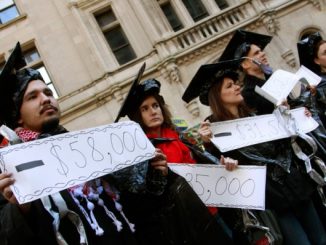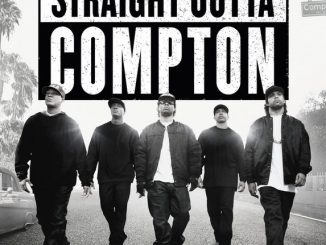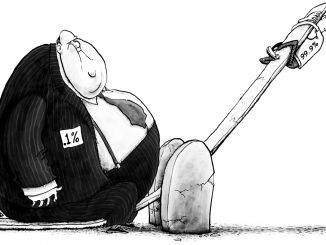On July 7, the Puerto Rico government failed to make a 5.8 million dollar payment due on the Island’s immense 72 billion dollar debt to Wall Street banks. The governor of Puerto Rico explained that the Island’s debts were unpayable given the long-term decline of its economy. Immediately following Puerto Rico’s default, the bankers demanded the government make massive cutbacks to public education, health services and pensions as well as boosting the sales tax to 11.5 percent to generate funds to pay the debts.
Puerto Rico has been a colony of the U.S. since 1898 when it was seized from Spain. The U.S. government says Puerto Ricans are U.S. citizens but Puerto Rico has no voting members in the U.S. House of Representatives or the Senate. No one living in Puerto Rico can vote for the U.S. President.
For nearly 120 years the wealth of Puerto Rico has been in the hands of powerful U.S. banks and corporations which have exploited the population. Starting in the 1940s, the U.S. government and big U.S. corporations crushed small scale farming forcing millions of Puerto Ricans into low-wage factories both in Puerto Rico and in the U.S. mainland. Puerto Rico is forced to import much of the food it needs. The cost of living is kept high by laws supporting U.S. corporations that control these imports and much else, all of which has contributed to putting Puerto Rico deeply into debt.
Today, Puerto Rico’s debt takes the form of tax free bonds issued by the government, with most of these bonds owned by banks that bought them at huge discounts. But now they want to get paid in full. The way the bankers see it, each of the 3.5 million Puerto Ricans
owes them $200,000.
With the passage of global trade deals, most of the factories in Puerto Rico have closed as U.S. investors shift production to places in the underdeveloped world with even lower wages. Half of the Puerto Rican population lives on less than $19,429 per year. The poverty rate is 40 percent higher than the poorest State in the U.S. – Mississippi.
The Puerto Rican debt crisis has been building since the economic crash of 2008. The response of the Puerto Rican government has been to close schools and hospitals, raise the sales tax to 11.5 percent, and impose wage cuts on public employees to make interest payments on its debts. It has raised the cost of electricity and water for ordinary people. It has cut taxes and fees for businesses and is trying to cut the minimum wage. It claims these subsidies to business will grow the economy. But unemployment, rising even before the 2008 crisis, is now officially at 13.8 percent, higher than any state in the U.S. And Puerto Rican migration to the U.S. mainland has increased with 50 percent of the immigrants being young adults with college degrees.
The capitalists have made great profits from building up this mountain of unsustainable debt. They don’t expect these loans to be repaid – these loans are simply a tool to increase their profits through squeezing the working class. They should pay for the crisis they created – not us.




